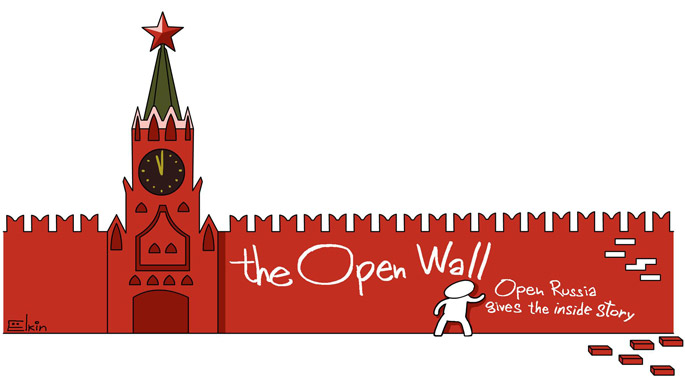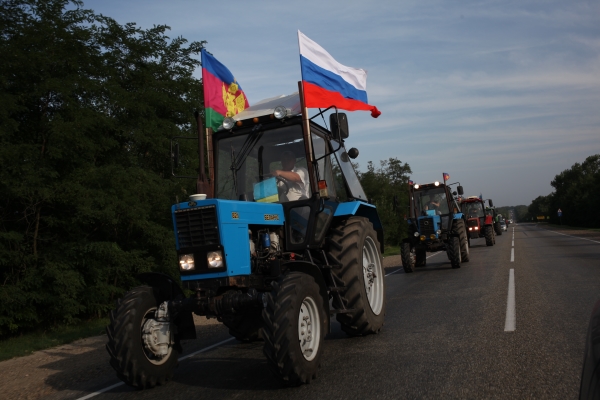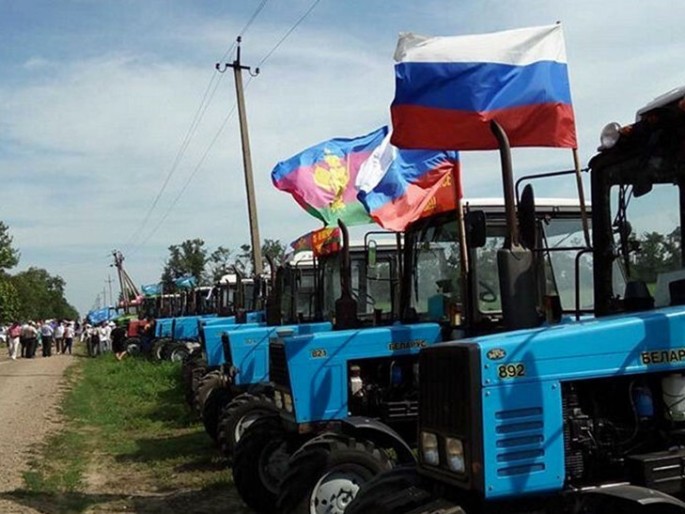The “Tractor March on Moscow”

The “Tractor March on Moscow”
The so-called “Tractor March on Moscow” recently staged by Kuban farmers, was met with understanding and concern in the Kremlin – as if …

The economic downturn couldn’t have failed to become a breeding ground for social protests. And the configuration of the Russian state is such that the greatest hardships are falling precisely on the shoulders of Putin’s core electorate – the proverbial 86% of the population who supposedly support whatever course of action the president may embark upon.
A major agricultural region in Russia’s south, Krasnodar Krai (also known as the Kuban) is over twice the size of Belgium. It was Krasnodar that played host to the Sochi Olympics, and Krasnodar, too, that served as the playground for Sergei Tsapok and his criminal gang (its fringes blurring into those of the local authorities), responsible, among other things, for seizures of local farmland (in November 2010, Tsapok’s thugs slaughtered a local entrepreneur and his entire family in the village of Kuschevka; 12 people were killed, including four children). Today, farmer Alexei Volchenko, one of the organisers of the tractor march on Moscow, insists that “the entire region is one giant Kuschevka: there isn’t a single district in Krasnodar that isn’t reigned over by lawlessness.” The farmers’ primary grievance is this: they’re being deprived of their lands by raiders who – supported as they are by law enforcement agencies – won’t shy away from fraud, unbridled threats, and even outright violence, and whose methods are being legitimised in the courts. Ultimately, the farmers’ lands often end up in the hands of major agro-holdings.
Playing the role of protest leader is costing Volchenko dearly: his house has already been set ablaze, while unidentified assailants smashed in his elderly father’s head and broke his jaw. Volchenko had previously believed that, if he could only secure a meeting with Investigative Committee chief Alexander Bastrykin, justice for Krasnodar’s farmers would soon follow. But Bastrykin’s conduct mirrored that of any other Putinist official. Claiming this was the first he’d heard of any of these goings-on, Bastrykin pledged to investigate the situation. But, as far as Aleksei Volchenko can see, Krasnodar’s raiders still have free rein over the region. “Rulings on land seizures are being made by judges whose relatives work in agriculture and are interested parties in the case,” he says. “During Medvedev’s visit to Kuban, the prime minister was talking to a farmer in the company of an individual who’d seized a portion of that selfsame farmer’s land in the course of a raid.”

The farmers decided to act. Their first tractor march on Moscow (some 1270 km away) had been due to be held in March of this year, but representatives from the Putin-friendly United People’s Front (ONF) persuaded them against it (the ONF ultimately failed to fulfil any of the promises they’d made to the farmers). Disrupting the protesters’ plans was made easier by the fact that many of the farmers – even those in favour of the general idea of staging a march – were nonetheless afraid of letting down Vladimir Putin. “If the lads were to go on this march, a lot of phone calls would start coming in from abroad,” says Krasnodar farmer Svetlana Shevtsova. “After all, Putin’s trying to resolve conflicts across the board, he’s advanced Russia to a high level of functioning, and all of a sudden we’ve got this internal mayhem erupting? That’d really be dropping the president in it.”
So they came to negotiate with the local authorities in T-shirts emblazoned with the blessed face of the president, motivated by what would seem to be a sincerely held belief that Mr Putin was simply unaware of their problems.
Seventeen tractors and a number of cars began their advance on Moscow on August 21, only to be delayed by police on eight separate occasions in Krasnodar Krai alone. “You’ll be seeing a second Novocherkassk,” the farmers were told, in reference to 1962’s Soviet Army massacre of striking workers in that town. “We’ll butcher you like cattle in a slaughterhouse.”
By August 22, the authorities had finally decided what to do with the farmers, and blocked the convoy near Rostov-on-Don. According to the farmers’ estimates, they were surrounded by some 150 police officers. “Two of our guys were taking photos of the extent of the police presence. Both were attacked by police officers, one was beaten up and had his jaw broken, […] and they tried to haul another farmer into a car and drive him off somewhere.”
On August 23, Leonid Beliak, the deputy presidential envoy in the Southern Federal District, arrived for talks with the farmers, but the ensuing negotiations yielded no breakthrough, and, half an hour after Beliak’s departure, fourteen protesters were detained by police – a sequence of events that the farmers construed as a betrayal. On the next day, three of the detainees were arrested for 10 days, with the rest fined and released.
But disrupting the march and jailing a paltry trio of protesters wasn’t enough for the authorities. Real repressions awaited the farmers on their return to Krasnodar. Nikolai Borodin’s property, for example, was searched by thirty FSB personnel simultaneously, while police threatened to charge Alexei Volchenko with extremism. A further twelve people ultimately received jail terms of between five and ten days, with Volchenko among their number. “I can’t believe this is happening to us, in our own country. We never anticipated that things would get this terrible,” confessed farmer Nina Karpenko.
The tractor march on Moscow never made it to the capital, but it will nevertheless leave a mark of its own, however modest, on the regime: the harrying and jailing of the Kuban farmers is symptomatic of the extreme degree of fear now gripping the Kremlin (last year’s trucker protests, by comparison, passed without mass arrests). And this, of course, is why the president only recently created the National Guard – to protect him from his supporters.



